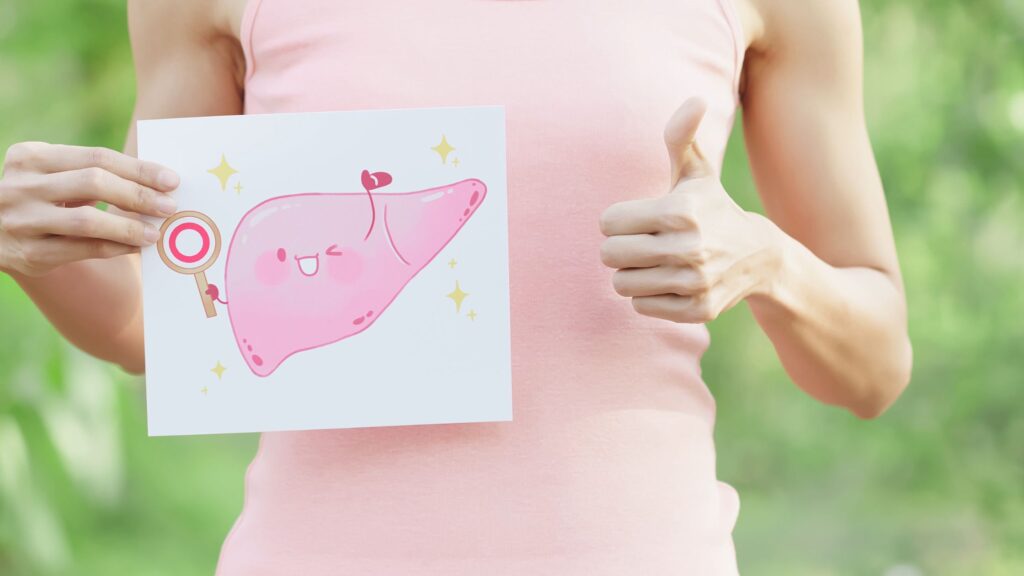When we think about hormone balance, we often focus on the ovaries, adrenals, or thyroid. But there’s one vital organ working behind the scenes to keep your hormones in check: your liver.
Your liver isn’t just a detox organ—it’s a hormone-processing powerhouse. It breaks down excess hormones, eliminates used ones, and converts hormones into usable forms. If your liver is sluggish or overburdened, hormonal symptoms like bloating, PMS, acne, fatigue, or mood swings may follow.
Let’s explore why your liver deserves more attention in any hormone-balancing plan.
How the Liver Regulates Hormones
Your liver plays multiple critical roles in hormone regulation:
1. Hormone Breakdown and Elimination
The liver metabolises hormones, especially oestrogen and cortisol.
Used hormones are processed through Phase 1 and Phase 2 liver detoxification pathways and eliminated via bile and the digestive system.
If this process is sluggish, “used” oestrogen can recirculate, leading to symptoms of oestrogen dominance.
2. Conversion of Hormones
The liver helps convert thyroid hormones (T4 to active T3).
It also supports the conversion of cholesterol into sex hormones (oestrogen, progesterone, testosterone).
3. Bile Production
Bile binds to excess hormones and toxins so they can be excreted.
If bile flow is poor (due to liver congestion or gallbladder issues), hormones may be reabsorbed, increasing the body’s hormonal burden.
Signs Your Liver May Be Affecting Hormone Balance
PMS, bloating, or heavy periods
Acne, especially around the jawline or chin
Headaches or breast tenderness before your period
Mood swings or irritability
Fatigue or brain fog
Skin rashes or histamine sensitivity
Hormonal weight gain (especially around hips, thighs, or midsection)
How to Support Your Liver for Better Hormone Balance
1. Eat Cruciferous Vegetables Daily
Broccoli, cauliflower, kale, Brussels sprouts, and rocket support Phase 1 & 2 detoxification and oestrogen clearance.
2. Support Bile Flow
Bitter foods like dandelion greens, radicchio, artichoke, and lemon water help with bile production.
Beetroots and apple cider vinegar can support gentle liver and gallbladder stimulation.
3. Ensure Daily Elimination
If you’re constipated, hormones like oestrogen can be reabsorbed.
Fibre, hydration, and magnesium citrate may help promote healthy bowel movements.
4. Avoid Endocrine-Disrupting Chemicals
Reduce xenoestrogens found in plastics, conventional skincare, perfumes, and cleaning products.
Opt for natural alternatives and store food in glass or stainless steel.
5. Key Liver-Supportive Nutrients
B vitamins (especially B6, B9, B12)
Magnesium – supports Phase 2 detoxification
Milk thistle – protects and regenerates liver cells
NAC and glutathione – antioxidant support for toxin clearance
Calcium D-glucarate – helps with oestrogen detoxification
Functional Testing to Explore
Oestrogen and progesterone testing (saliva or DUTCH)
Liver enzymes (ALT, AST, GGT)
Oestrogen metabolites (2-OH, 4-OH, 16-OH)
Stool testing for beta-glucuronidase (an enzyme that recycles oestrogen in the gut)
Functional Medicine Insight
You can’t fully balance hormones without supporting detoxification, and you can’t support detoxification without a healthy, well-functioning liver. Whether you’re dealing with PMS, perimenopause, acne, or thyroid issues, your liver should always be part of the conversation.
Ready to support your liver and clear hormone symptoms at the root? Book a consultation or grab my Liver Support Guide to get started.

